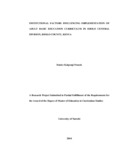| dc.description.abstract | Education is a basic need to all citizens as proclaimed by the universal charter of
Human Rights of 1948. Adult Basic Education (ABE) is a major component of
Adult and Continuing Education (ACE) sub-sector of Education. The
implementation of ABE curriculum in Kenya has had a lot of challenges. Despite
all the government’s effort to fight illiteracy in Kenya, recent studies reveal that
there are many Kenyans who are illiterates. Isiolo Central Division suffers the
problem of learners dropping out of school due to early marriages, search for the
green pasture for their animals among other reasons. However, there have been
low enrolment rates in adult literacy classes in Isiolo Central Division. The study
investigated the institutional factors influencing the implementation of Adult
Basic Education curriculum implementation in Isiolo Central Division, Isiolo
County, Kenya. The study in particular sought to determine the influence of
teaching/learning resources, professional qualifications of the Adult Basic
Education facilitators, supervision of ABE and availability of funds on the
implementation of ABE curriculum in the Division. The study adopted the
descriptive survey design. The target population comprised of one (1) Adult
Education Officer, thirty two (32) adult facilitators and 1016 adult learners
making a total of 1049 respondents. The study used Purposive sampling to sample
one ABE officer and thirty two ABE facilitators while stratified random sampling
was used to sample one hundred and two ABE learners. Questionnaires and focus
group discussion were used to collect data. A pilot study and discussion with
experts was used to realize instrument validity. Instrument reliability was
obtained using a pilot study. The researcher established that most of the
facilitators utilize teaching/learning resources and that the teaching/learning
resources are valued by both learners and facilitators. The study found out that
teaching/learning resources in ABE centres are provided by learners, government,
religious groups and NGOs. The study established that learners value supervision.
The study established that ABE centres are financed by private
institutions/individuals, government, NGOs and religious groups. The researcher
further found that the funds are used to acquire teaching/learning resources, to pay
for salaries and pay for rent of the premises used. The study recommended that
adequate teaching/learning resources should be provided in ABE centres; the
ministry of education should hire professionally qualified ABE facilitators in
ABE centres; ABE supervisors should visit and supervise ABE centres regularly
and the government, private sector, NGOs and religious groups should increase
the funds they provide to ABE in order to enhance the process of ABE curriculum
implementation. The researcher suggested that study should be carried out to
establish the impact of institutional factors on the performance of ABE learners in
national examinations and another one on establish the impact of
academic/professional qualification and experience of facilitators on the
performance of ABE learners in national examinations. | en_US |

